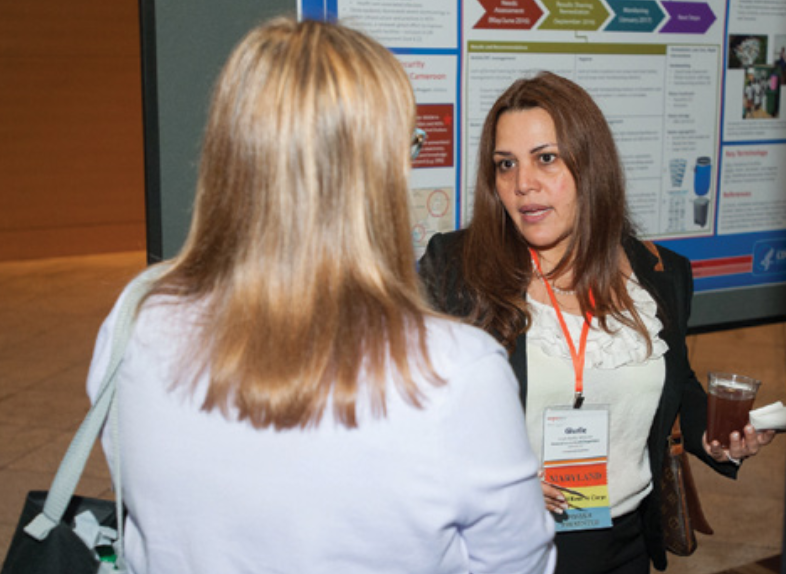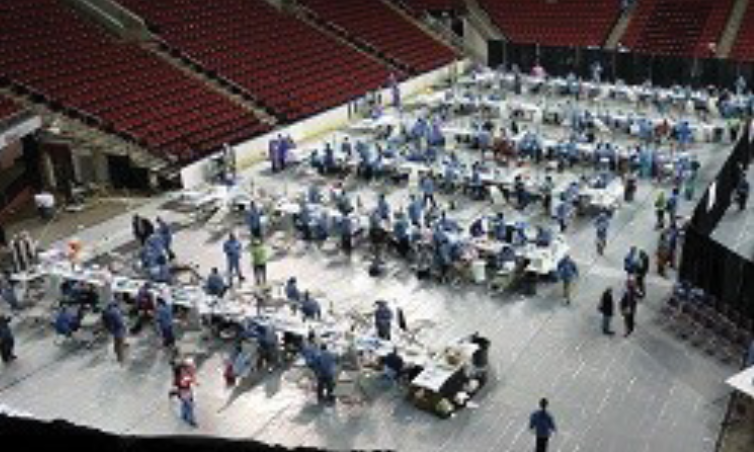Robust community healthcare coalition preparedness, with critical partners, paves the way for a hospital’s successful response in the event of a major disaster. Established in 2012 by ASPR, the Hospital Preparedness Program aims to strengthen community- wide planning for healthcare resiliency by strengthening Healthcare Coalition capabilities, not just the individual hospital.
Through relationships cultivated in the Ventura Healthcare Coalition, the Ventura County MRC (CA) worked with hospitals, Emergency Medical Services Agency, and Public Health in their operational areas and demonstrated MRC volunteer skills and ability to seamlessly integrate into the hospitals’ surge capacity during a large scale event. The Ventura County MRC conducted hospital assessments to identify a training curriculum, trained 95 MRC volunteers alongside 80 Public Health Nurses to prepare communities and hospitals for disaster-induced medical surges, and produced a “bedside credentialing toolkit.”
Engagement with healthcare coalitions may take on different manifestations for other units across the country. As a member of its local Healthcare Coalition, the Southwest Florida MRC (FL) conducted hospital decontamination exercises and participated in medical surge simulations aimed at testing hospitals’ emergency plans while the Alameda County MRC (CA) partnered with local community members including their local Healthcare Coalition members to support Alameda County in disseminating timely educational messages and inquiries related to Zika.

America is suffering from an opioid crisis. According to the National Institutes of Health (NIH), opioid prescriptions such as hydrocodone and oxycodone have dramatically increased over the past 20 years from around 76 million prescriptions in 1991 to almost 207 million in 2013. Joining the fight to combat opioid addiction and overdoses, the following MRC units provide examples of how units around the nation are combatting the opioid crisis facing their communities by bringing together local faith leaders, law enforcement, healthcare providers, concerned family members, and other interest groups.
The Torrington MRC (CT) designed its program to focus on “providing training directly to care givers and high risk individuals,” however shifted their scope after receiving requests for training to be provided to agencies in their county that work with high risk individuals. To date, the unit has trained over 500 community members on harm reduction strategies, overdose recognition and reversal skills. Similarly, the LaSalle County MRC (IL) received requests to provide training from the LaSalle County Sheriff’s Office. The MRC unit trained 145 officers and 10 LaSalle County law enforcement agencies on opioid overdose and use of nasal naloxone. Their program ultimately saved 12 lives in 2016.
In the same effort to combat the crisis, volunteers from the Howard County MRC (MD) worked alongside the Howard County Health Department’s (HCHD) Bureau of Behavioral Health (BBH) to augment their existing Opioid Overdose Response (OOR) Program while the South Hadley MRC (MA) targeted healthcare providers, public health, and pharmacies to provide a comprehensive training to Sheltering Residents with Substance Dependency.
People with disabilities and activity limitations are frequently omitted from preparedness and planning activities. Further, “disaster preparedness and emergency response systems are typically designed for people without disabilities.” It is therefore vital to consider people with special needs when developing disaster response protocols.
MRC units encourage vulnerable populations to participate in the dialogue and prepare for emergencies in varying capacities. For example, through presentations, TV programming, and other community outreach events, volunteers from Upper Merrimack Valley MRC (MA) and Greater River Valley MRC (MA) collaborated to provide emergency preparedness information and direct training to vulnerable residents and their caregivers to reduce unnecessary 9-1-1 calls during large scale emergencies through greater self- sufficiency and disaster awareness. The Upper Merrimack Valley MRC also worked with local municipal departments to enroll 70 vulnerable Westford residents in the town’s “Medical Special Needs Registry” while making home visits with 72-hour kits, encouraging those with functional needs in a disaster to sign up in advance.
The Adams County MRC and Adams County Health Department (IL) also collaborated with 10 long-term care facilities in their jurisdiction to provide education on the importance of closed point of dispensing (POD) to build community resiliency. Memorandum of Understanding (MOUs) with the facilities were drafted in collaboration with local emergency management describing the technical assistance the Adams County Health Department and MRC unit would provide in establishing closed POD plans within the facilities. Training materials on closed PODs were also compiled for the long-term care facilities.
Designed to have a trickle-down effect, the University of Georgia MRC (GA) provided emergency preparedness train the trainer activities, developed specifically for local seniors to 10 agencies that work with seniors in their community. Preparedness kits and training materials were provided to each agency to train seniors with whom they work.
The Dallas County MRC (AL) launched its program, Doc in a Bus, to increase access to primary care services. The unit partnered with local healthcare coalitions to serve discharged hospital patients without regular primary care physicians in an effort to reduce patient readmission rates—an indicator of healthcare access.
“The typical patient served by Doc in a Bus has no insurance, no regular primary care physician, and suffers from a chronic disease like diabetes or high blood pressure,” according to the MRC unit coordinator. These patients frequently use the emergency department as their source of primary care, leading to dramatic healthcare costs in the community.
Dallas County MRC’s Doc in a Bus addresses this issue by providing mobile, free primary care to underserved populations. The bus has helped screen women who have never had Pap tests or mammograms and has helped people stay out of the emergency room by controlling their chronic diseases through medication and follow-up.
In 2016, Doc in a Bus served 422 patients in the community through 23 clinic visits and continues to provide primary care and education services to patients in need.
The MRC LC Connect project was the Lake County MRC’s (CA) initiative to increase local MRC membership, build volunteer competency, and strengthen community awareness of MRC unit capabilities. Through outreach campaigns at several health fairs, the Lake County MRC was able to recruit 57 active members who displayed great interest in the unit’s mission while educating community members about disaster preparedness, response, and recovery. One of the many MRC volunteers who participated in the local health fair, Heroes of Health, recalled, “One teenager was so intrigued and asked, ‘How do I get to educate the community on important emergency preparedness issues?’ We all looked at each other and smiled. We discussed when she turns 18, we would love to have her join us. She took the initiative to reach out and ask for materials and started doing education on campus about germs and even self-preparedness!”
With a well-prepared and trained mass of volunteers, the Lake County MRC was able to successfully deploy and intervene during the Clayton re, which destroyed nearly 200 homes. Deployment teams, including many volunteers recruited from different Lake County MRC partners across the county, were able to use their training and newfound numbers to bene t the community.

The Public Health Reserve Corps of Seattle King County (WA) unit enhanced community resiliency and collaboration by increasing their total number of volunteers with a targeted focus on increasing multilingual volunteers. In addition to diversifying its unit through their Enhancing Community Collaboration and Coalition project, they improved community preparedness and access to care; providing 7,464 volunteer hours in over four days as part of a multi-organization event aimed at providing healthcare, dental services and vision services to over 4,000 people with limited or no insurance at the Seattle King County Clinic. The unit also led an initiative to conduct outreach and increase services to veterans experiencing homelessness and increase participation of veterans volunteering in the Public Health Reserve Corps.
Through their relationships with nontraditional partners, the MRC unit successfully recruited new volunteers across a broader cultural and linguistic spectrum. The Public Health Reserve Corps worked to ensure a more resilient community and a stronger public health infrastructure with a focus on a vulnerable and at-risk population.